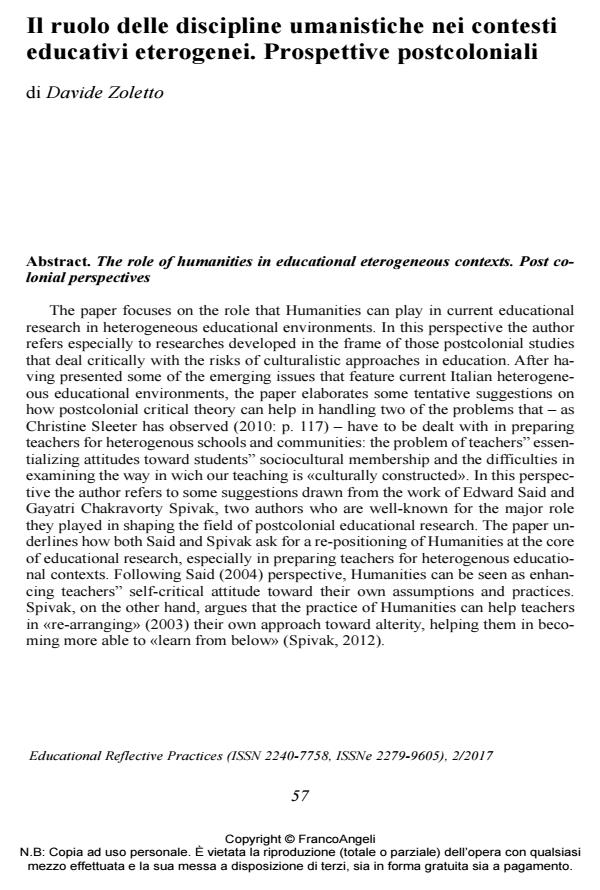The role of humanities in educational eterogeneous contexts. Post colonial perspectives
Journal title EDUCATIONAL REFLECTIVE PRACTICES
Author/s Davide Zoletto
Publishing Year 2018 Issue 2017/2
Language Italian Pages 14 P. 57-70 File size 204 KB
DOI 10.3280/ERP2017-002005
DOI is like a bar code for intellectual property: to have more infomation
click here
Below, you can see the article first page
If you want to buy this article in PDF format, you can do it, following the instructions to buy download credits

FrancoAngeli is member of Publishers International Linking Association, Inc (PILA), a not-for-profit association which run the CrossRef service enabling links to and from online scholarly content.
The paper focuses on the role that Humanities can play in current educational research in heterogeneous educational environments. In this perspective the author refers especially to researches developed in the frame of those postcolonial studies that deal critically with the risks of culturalistic approaches in education. After ha-ving presented some of the emerging issues that feature current Italian heterogeneous educational environments, the paper elaborates some tentative suggestions on how postcolonial critical theory can help in handling two of the problems that - as Christine Sleeter has observed (2010: p. 117) - have to be dealt with in preparing teachers for heterogenous schools and communities: the problem of teachers" essentializing attitudes toward students" sociocultural membership and the difficulties in examining the way in wich our teaching is «culturally constructed». In this perspective the author refers to some suggestions drawn from the work of Edward Said and Gayatri Chakravorty Spivak, two authors who are well-known for the major role they played in shaping the field of postcolonial educational research. The paper underlines how both Said and Spivak ask for a repositioning of Humanities at the core of educational research, especially in preparing teachers for heterogenous educational contexts. Following Said (2004) perspective, Humanities can be seen as enhancing teachers" self-critical attitude toward their own assumptions and practices. Spivak, on the other hand, argues that the practice of Humanities can help teachers in «re-arranging» (2003) their own approach toward alterity, helping them in becoming more able to «learn from below» (Spivak, 2012).
- Riflessività postcoloniale e ricerca pedagogica nei contesti ad alta complessità socioculturale Davide Zoletto, in EDUCATIONAL REFLECTIVE PRACTICES 1/2023 pp.139
DOI: 10.3280/erp1-2023oa15883
Davide Zoletto, Il ruolo delle discipline umanistiche nei contesti educativi eterogenei. Prospettive postcoloniali in "EDUCATIONAL REFLECTIVE PRACTICES" 2/2017, pp 57-70, DOI: 10.3280/ERP2017-002005